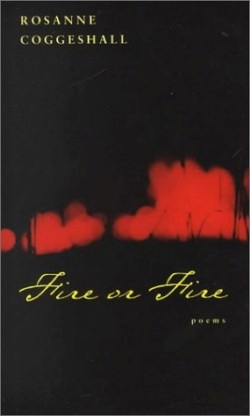Fire or Fire
Setting off on her journey with T.S. Eliot’s quote, “intolerable shirt of flame / Which human power cannot remove,” this author goes, and stays where the heat is hottest. Immediately, certain geographical coordinates are established: “In the world, / there are not many places / where people know our names. / In the world, / too many highways cross / deep places / slashed hats and harnesses / beginning to dissolve.” She is in real and figurative territory that only she can navigate for herself, a condition that proves both daunting and exhilarating to the poet.
Well on her way to the land of truth-telling, Coggeshall proceeds lyrically, specifically, and with a determination to say what she means, without dumbing it down or cutting back too much in the name of accessibility. Many poems read like religious communiqués: crystalline and forthright, with one section of the book entitled “Tributes”—a collection of varied elegies—and another one called, “Augustine Said,” which engages with the likes of Julian of Norwich, Pascal, and Thomas Merton.
The theme of human mortality permeates these poems, speculating on the impermanence of not only people, but the current world. Accomplished without didacticism or cliché, her meditative style is worth rereading for the meaning: “I see a piece of Sunday’s Times / dissolve in smoke; I know / that when next I sleep to wake / there will be no shadow: / nothing but this, / born comforter, the light I turn to / when morning moves least far.”
Though some poems appear more private, and therefore difficult to understand, the reward is in the second and third reading, when good concentration and an attentive ear reveals a complex intellect and gentle repetitions of sound and structure. Described in some places as a metaphysical poet, Coggeshall emphasizes “essential reality,” rather than “abstract reasoning,” both of which are suggested by this definition.
Fire or Fire is not for the recreational reader of poetry, nor for one who seeks instant gratification from quick flexes of verbal wit. It is, however, a satisfying tour for those that take language seriously and are willing to be challenged and implicated in the reading process.
Reviewed by
Holly Wren Spaulding
Disclosure: This article is not an endorsement, but a review. The publisher of this book provided free copies of the book to have their book reviewed by a professional reviewer. No fee was paid by the publisher for this review. Foreword Reviews only recommends books that we love. Foreword Magazine, Inc. is disclosing this in accordance with the Federal Trade Commission’s 16 CFR, Part 255.

